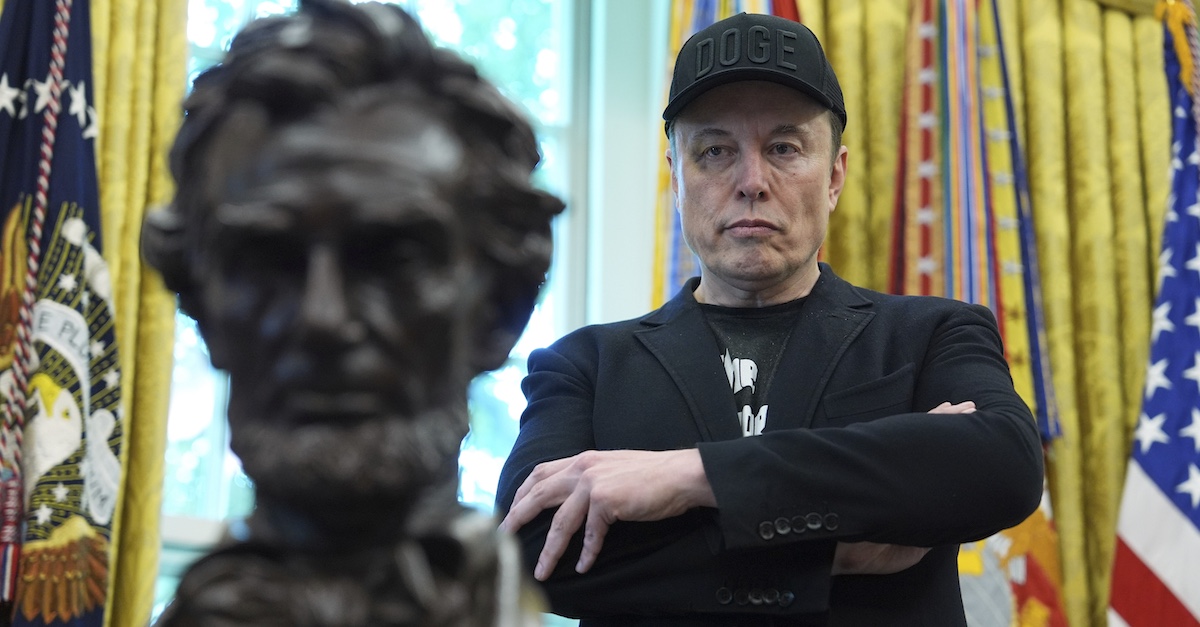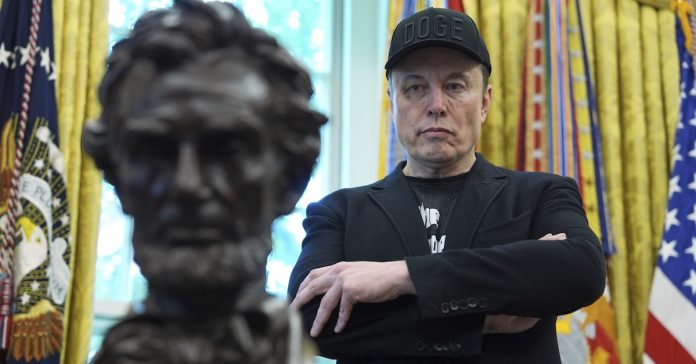
FILE – Elon Musk listens as President Donald Trump speaks during a news conference in the Oval Office of the White House, May 30, 2025, in Washington. (AP Photo/Evan Vucci, File).
A federal judge handed the New York Times a win on Wednesday when deciding that the newspaper can force the Trump administration to hand over a “list” of Elon Musk”s security clearances, noting that the tech billionaire has openly claimed to have a “top secret clearance.”
Months before “Dogefather” Musk’s bumpy exit from his “special government employee” role amid a much-publicized feud with President Donald Trump, the Times in March filed a Freedom of Information Act (FOIA) lawsuit.
That suit asked Senior U.S. District Judge Denise Cote to compel the U.S. Defense Counterintelligence and Security Agency (DCSA), within the Department of Defense, to produce a “list of security clearances for Elon Musk, including the extent and purview of each of the clearances.”
In the complaint, the Times noted that the government relied on a privacy exception to avoid disclosure despite confirming that there were “two pages of records responsive to the request.”
Cote, a Bill Clinton appointee, cut right to the chase when siding with the Times, pointing out that the “unwarranted invasion of personal privacy” exception to disclosure was undone by Musk’s own public remarks on X about having a “top secret clearance.”
I’ve had a top secret clearance for many years and have clearances that themselves are classified.
That said, FAR too much information is made “classified”. If something is easily found online or patently obvious, it should NOT be classified. This impedes effective… https://t.co/5DmRhDCkRo
— Elon Musk (@elonmusk) February 14, 2025
“In October 2024, Musk told a public town hall that he had a top-secret clearance. In February 2025, Congressman Mark Green stated in a hearing that Musk ‘has a top secret security clearance,'” Cote said. “Musk reposted a clip of Congressman Green’s statement on social media on February 14, writing, ‘I’ve had a top secret clearance for many years and have clearances that themselves are classified.'”
Thus, by discussing his claimed security clearances, Musk “waived” a privacy interest, and the public has a “substantial” interest in learning whether the “major government contractor” does, in fact, have security clearances, the judge said.
In addition, Musk’s use of cannabis and prescribed ketamine presented “issues relevant” to Security Executive Agent Directive 4 (SEAD-4), DCSA guidelines that take drug use, foreign contacts, and other factors into account when judging whether a person is “an acceptable security risk,” Cote said.
Love true crime? Sign up for our newsletter, The Law&Crime Docket, to get the latest real-life crime stories delivered right to your inbox.
This opens the door for the public to learn whether Musk’s clearances, if they exist, were issued “subject to any conditions or waivers,” which could offer “meaningful insight” as to whether the government has fulfilled its “duty” to continuously vet his fitness to hold such clearances, the judge said.
“It is true that Musk has not publicly discussed whether his security clearance is subject to any conditions or waivers and, if so, what those conditions or waivers entail. Musk has, however, publicly discussed his drug use, NASA’s requirement that he submit to random drug testing due to his drug use, and his contacts with foreign leaders,” Cote concluded. “His posts on X on these topics have collectively garnered over 2 million views. And it is undisputed that drug use and foreign contacts are two factors DCSA considers when determining whether to impose conditions or waivers on a security clearance grant.”
Cote added that if the government has any Musk privacy concerns “beyond the issues discussed here,” it can privately propose redactions for her review.
Read the full ruling here.

